初中英语知识总复习
初中英语总复习(全册)知识点归纳
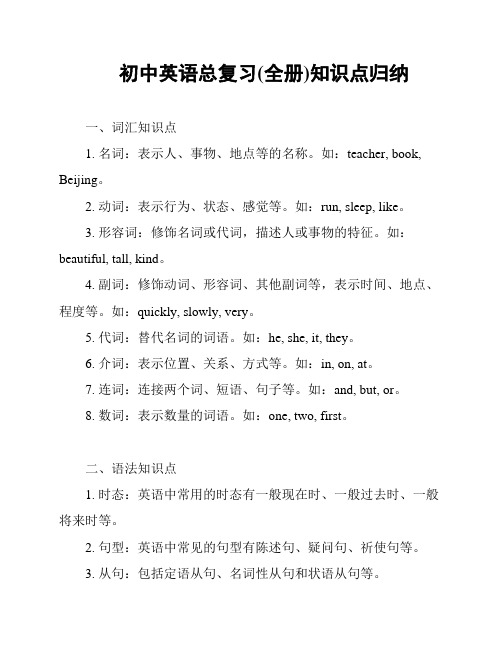
初中英语总复习(全册)知识点归纳一、词汇知识点1. 名词:表示人、事物、地点等的名称。
如:teacher, book, Beijing。
2. 动词:表示行为、状态、感觉等。
如:run, sleep, like。
3. 形容词:修饰名词或代词,描述人或事物的特征。
如:beautiful, tall, kind。
4. 副词:修饰动词、形容词、其他副词等,表示时间、地点、程度等。
如:quickly, slowly, very。
5. 代词:替代名词的词语。
如:he, she, it, they。
6. 介词:表示位置、关系、方式等。
如:in, on, at。
7. 连词:连接两个词、短语、句子等。
如:and, but, or。
8. 数词:表示数量的词语。
如:one, two, first。
二、语法知识点1. 时态:英语中常用的时态有一般现在时、一般过去时、一般将来时等。
2. 句型:英语中常见的句型有陈述句、疑问句、祈使句等。
3. 从句:包括定语从句、名词性从句和状语从句等。
4. 否定形式:在英语中通过在句子中加入否定词来表示否定的意思。
5. 疑问形式:在英语中通过改变句子语序或加入疑问词来构成疑问句。
6. 介词短语:一种由介词和它的宾语构成的结构,用来修饰名词或动词。
三、阅读技巧1. 抓主题:阅读时要注意抓住文章的主题,从中找出关键信息。
2. 理解词义:通过上下文,猜测不认识的单词的意思。
3. 推理推断:通过已知信息进行推理,得出未知信息。
4. 划重点:将文章中所述的重要信息标记出来,有助于记忆和理解。
5. 阅读速度:提高阅读速度的技巧有先读标题、段落开头和结尾。
以上是初中英语总复的知识点归纳,希望对你的复有所帮助!。
精编初中英语中考总复习语法知识总结归纳大全

初中英语语法大全一.词类(Parts of Speech)名词英文名称The Noun(缩写为n.) 表示人或事物的名称,例词:job 工作He's trying to get a job.他正在找工作。
table 桌子I'd like a table for two at about 8:30, please.我想订一张8:30左右的双人桌。
phone 电话I have to make a phone call.我得打个电话。
car 汽车Where can I park the car?我可以在哪里停车呀?cat 猫Your cat isn't very friendly.你的猫不太友好。
冠词英文名称The Article(缩写为art.) 用在名词前帮助说明名词所指的人和或事物,例词:a(an)There's a visitor for you.有位客人找你。
theThe phone rang.电话铃响了。
代词英文名称The Pronoun(缩写为pron) 用来代替名词、形容词或是数词,例词:I 我we 我们you 你,你们he 他she 她it 它that 那this 这what 什么形容词英文名称The Adjective(缩写为adj.) 用以修饰名词,表示人或事物的特征,例词:new 新的This idea isn't new.这主意不新鲜。
fast 快的That clock's an hour fast.那个钟快了一个小时。
white 白色的He had nice square white teeth.他的牙齿洁白而整齐,十分好看。
red 红色的She was red with shame.她羞愧地红了脸。
fine 美好的There is a fine view of the countryside.这里可以看到乡村的美景。
good 好的The results were pretty good.结果相当不错。
初中英语总复习知识点归纳汇总(41页)
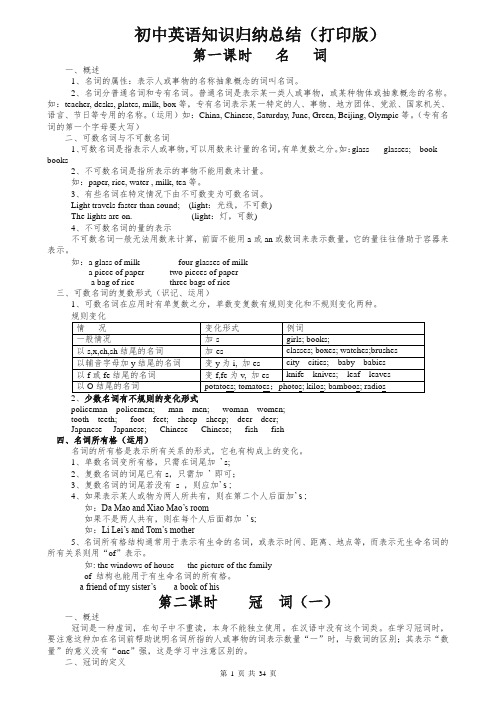
初中英语知识归纳总结(打印版)第一课时名词一、概述1、名词的属性:表示人或事物的名称抽象概念的词叫名词。
2、名词分普通名词和专有名词。
普通名词是表示某一类人或事物,或某种物体或抽象概念的名称。
如:teacher, desks, plates, milk, box等,专有名词表示某一特定的人、事物、地方团体、党派、国家机关、语言、节日等专用的名称。
(运用)如:China, Chinese, Saturday, June, Green, Beijing, Olympic等。
(专有名词的第一个字母要大写)二、可数名词与不可数名词1、可数名词是指表示人或事物,可以用数来计量的名词,有单复数之分。
如:glass-----glasses; book---- books2、不可数名词是指所表示的事物不能用数来计量。
如:paper, rice, water , milk, tea等。
3、有些名词在特定情况下由不可数变为可数名词。
Light travels faster than sound; (light:光线,不可数)The lights are on. (light:灯,可数)4、不可数名词的量的表示不可数名词一般无法用数来计算,前面不能用a或an或数词来表示数量,它的量往往借助于容器来表示。
如:a glass of milk ------ four glasses of milka piece of paper ------two pieces of papera bag of rice ------three bags of rice三、可数名词的复数形式(识记、运用)1、可数名词在应用时有单复数之分,单数变复数有规则变化和不规则变化两种。
policeman---policemen; man---men; woman---women;tooth---teeth; foot---feet; sheep---sheep; deer---deer;Japanese--- Japanese; Chinese --- Chinese; fish --- fish四、名词所有格(运用)名词的所有格是表示所有关系的形式,它也有构成上的变化。
(完整版)初中英语总复习+笔记大全

初三英语总复习笔记七年级(上)Unit 1 复习要点短语和句子1、Good morning/ Good afternoon / evening 。
早上/下午/晚上好2、(It’s) Nice to meet/see you。
= (It’s)Good to meet/see you.= (I'm) Glad to meet/see you= (I’m) Pleased to meet/see you= (I'm) Happy to meet/see you. 很高兴见到你3、Welcome to China 欢迎到中国来.4、Thanks /Thank you . 谢谢5、You’re welcome 。
/ That’s all right (OK) .不用谢,6、Stand up . 起立 Sit down .坐下7、This is…。
.介绍第三者的用语,复数用These are…8、How do you do ? 您好 9、 How are you ? 您好吗? How is she\he? 她\他好吗?10、I’m fine 。
我很好。
11、What’s your/his /her name ?= May I know/have your/his /her name?Could you please tell me your/his /her name?你/他/她叫什么名字?12、My name is Jane 。
我名叫简13、Where are you from ? = Where do you come from? Where is he/she from?= Where does he/she come from?你/他/她/他们来自哪里?14、I am / He (She) is /They are from Canada/Japan/the U.S。
A/England/Cuba/China。
初中英语总复习资料(免费)
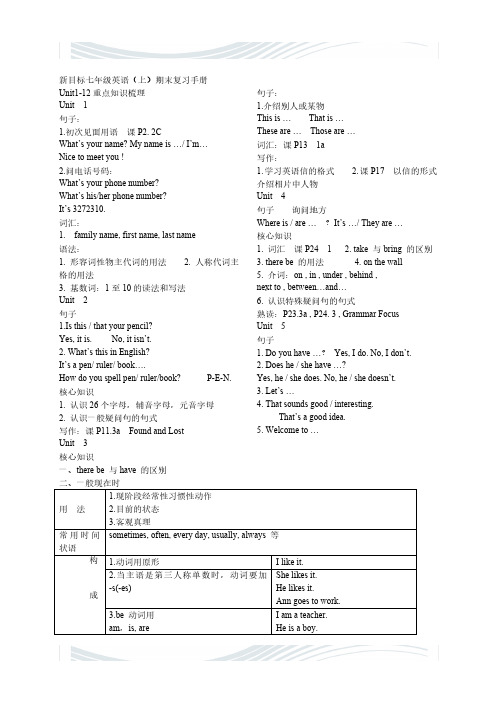
熟读
课本 P38 1a 2a 2b
Unit 12
句子
1. What’s your favorite subject?
My favorite subject is English.
2. Why do you like …? Because it is interesting.
核心知识
1. 名词所有格 2. 星期
4. look at
5. a lot
6. in a word
7. act, actor
8. in fact
9. 一般现在时
10. 名词复数形式
写作 谈论自己爱好的电影类型 课本 P56-57
熟读
课本 P54 G.F. , P55 3a
Unit 10
句子
1. Can you play the guitar?
2. How much are they? They are 100 dollars.
问颜色
1. What color do you want ? What color is it?
购物用语:P39 3a
1. Can I help you? What can I do for you?
2. Yes, please.
2. Does he want to …?
Yes, he does. No, he doesn’t.
3. What kind of movies do you like?
I like action movie.
核心知识
1. 并列连词 and , but
2. on weekends
3. want to do sth.
Unit 5
Yes, it is. No, it isn’t.
初中英语所有知识点复习大全

初中英语全部知识点复习大全史上最全的中考考点大汇总(直接打印版)语法一冠词语法考点解析考点一不定冠词a/an 的用法1.基本用法(1) 泛指某个人或物,意思为“一”,数目看法比one 弱。
A girl is looking for you. 有个女孩在找你。
(2)用于可数名词单数形式前,表示一类人或物。
A dog is a useful animal. 狗是一种实用的动物。
(3) 用于表示时间、速度、价钱等意义的名词前,表示“每一”,相当于every或 each。
We have six classes a day. 我们每日六节课。
(4)用于序数词前,表示“又一,再一”。
The apple is delicious. Can I have a second one?这苹果很好吃,我能再吃一个吗?(5)用于物质名词前方,表示“一种、一场”等。
What a heavy rain!好大的一场雨!(6)组成一些固定短语。
a little bit 有点儿 a couple of 两个all of a sudden 忽然have a cold 感冒have a look 看一看have a rest 歇息一下have a try 试一试have a walk 漫步once in a while 有时pay a visit to 拜见play a role 发挥作用quite a lot/few 很多2.a /an 的辨析不定冠词 a 与 an 是一对孪生姐妹。
a n 用在以元音音素开头的名词前,如an egg 。
即使单词拼写以辅音字母开头,假如单词的读音是以元音音素开头,也要用an,如 an hour 。
反之即便单词拼写以元音字母开头但读音是以辅音音素开头,加不定冠词时也要用 a,如 a university 。
(1) 常有的以元音音素开头的要点名词和形容词animal answer arm appleeasy egg eraser elephanteye hour idea impoliteimportant interesting orange umbrellauncle unhappy unknown unpleasantunusual(2)常有的不定冠词易错短语an honest boy a university a usual story an houra useful book a European countrya UFO单项选择1.( 2019·山东莱芜中考 ) Wolf WarriorsⅡ is such exciting film that I have seen it three times.A. a B. anC. the D. /2.( 2019·贵州安顺中考)France is European country while Thailandis Asian country.A. an; an B. an; a C. a;D. a; ana) The man is driving at 40 kilometres hour.3.( 2019·甘肃白银中考C. the D. /A. a B. an4.( 2019·江苏宿迁中考 )There will be talk on good manners at the school hallthis afternoon.A. the B. an C. a D. /考点二定冠词的用法1.用在特定的人或物的名词前,表示特指。
初中英语语法大全总复习

英语语法大全学习提纲一、词类、句子成分和构词法:1、词类:英语词类分十种:名词、形容词、代词、数词、冠词、动词、副词、介词、连词、感叹词。
1、名词(n.):表示人、事物、地点或抽象概念的名称。
如:boy, morning, bag, ball, class, orange.2、代词(pron.):主要用来代替名词。
如:who, she, you, it .3、形容词(adj..):表示人或事物的性质或特征。
如:good, right, white, orange .4、数词(num.):表示数目或事物的顺序。
如:one, two, three, first, second, third, fourth.5、动词(v.):表示动作或状态。
如:am, is,are,have,see .6、副词(adv.):修饰动词、形容词或其他副词,说明时间、地点、程度等。
如:now, very, here, often, quietly, slowly.7、冠词(art..):用在名词前,帮助说明名词。
如:a, an, the.8、介词(prep.):表示它后面的名词或代词与其他句子成分的关系。
如in, on, from, above, behind.9、连词(conj.):用来连接词、短语或句子。
如and, but, before .10、感叹词(interj..)表示喜、怒、哀、乐等感情。
如:oh, well, hi, hello.2、句子成分:英语句子成分分为七种:主语、谓语、宾语、定语、状语、表语、宾语补足语。
1、主语是句子所要说的人或事物,回答是“谁”或者“什么”。
通常用名词或代词担任。
如:I’m Miss Green.(我是格林小姐)2、谓语动词说明主语的动作或状态,回答“做(什么)”。
主要由动词担任。
如:Jack cleans the room every day. (杰克每天打扫房间)3、表语在系动词之后,说明主语的身份或特征,回答是“什么”或者“怎么样”。
初中英语总复习知识点总结
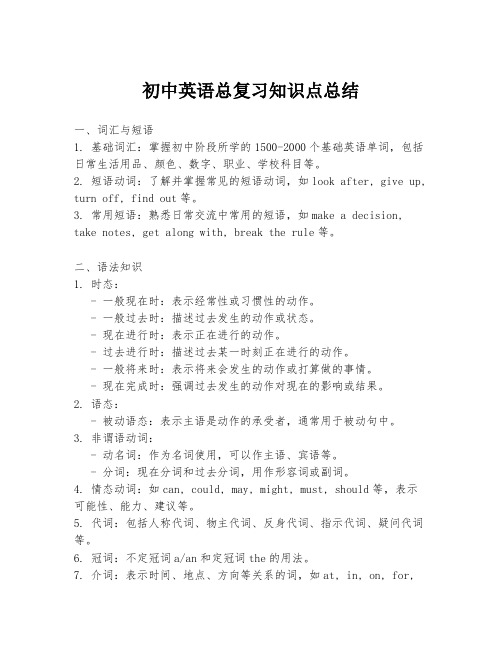
初中英语总复习知识点总结一、词汇与短语1. 基础词汇:掌握初中阶段所学的1500-2000个基础英语单词,包括日常生活用品、颜色、数字、职业、学校科目等。
2. 短语动词:了解并掌握常见的短语动词,如look after, give up, turn off, find out等。
3. 常用短语:熟悉日常交流中常用的短语,如make a decision, take notes, get along with, break the rule等。
二、语法知识1. 时态:- 一般现在时:表示经常性或习惯性的动作。
- 一般过去时:描述过去发生的动作或状态。
- 现在进行时:表示正在进行的动作。
- 过去进行时:描述过去某一时刻正在进行的动作。
- 一般将来时:表示将来会发生的动作或打算做的事情。
- 现在完成时:强调过去发生的动作对现在的影响或结果。
2. 语态:- 被动语态:表示主语是动作的承受者,通常用于被动句中。
3. 非谓语动词:- 动名词:作为名词使用,可以作主语、宾语等。
- 分词:现在分词和过去分词,用作形容词或副词。
4. 情态动词:如can, could, may, might, must, should等,表示可能性、能力、建议等。
5. 代词:包括人称代词、物主代词、反身代词、指示代词、疑问代词等。
6. 冠词:不定冠词a/an和定冠词the的用法。
7. 介词:表示时间、地点、方向等关系的词,如at, in, on, for,with等。
8. 连词:连接句子或句子成分的词,如and, but, or, because, although等。
三、句型结构1. 简单句:只有一个主谓结构的句子。
2. 并列句:用并列连词连接的两个或多个简单句。
3. 复合句:包含主句和从句的句子,从句可以是名词性从句、定语从句或状语从句。
- 名词性从句:包括主语从句、宾语从句、表语从句和同位语从句。
- 定语从句:修饰名词或代词的从句,通常由关系代词who, whom, whose, which, that等引导。
初中英语总复习资料(免费)

新目标七年级英语(上)期末复习手册Unit1-12重点知识梳理句子:Unit11.介绍别人或某物句子:Thisis⋯Thatis⋯1.初次见面用语课P2.2CTheseare⋯Thoseare⋯词汇:课P131aWhat’syourname?Mynameis⋯/I’m⋯Nicetomeetyou!写作:2.问电话号码:1.学习英语信的格式2.课P17以信的形式What’syourphonenumber?介绍相片中人物What’shis/herphonenumber?Unit4It’s3272310.句子询问地方词汇:Whereis/are⋯?It’s⋯/Theyare⋯1.familyname,firstname,lastname核心知识语法:1.词汇课P2412.take与bring的区别1.形容词性物主代词的用法2.人称代词主3.therebe的用法4.onthewall格的用法5.介词:on,in,under,behind,3.基数词:1至10的读法和写法nextto,between⋯and⋯Unit26.认识特殊疑问句的句式句子熟读:P23.3a,P24.3,GrammarFocus1.Isthis/thatyourpencil?Unit5Yes,itis.No,itisn’t.句子2.What’sthisinEnglish?1.Doyouhave⋯?Yes,Ido.No,Idon’t.It’sapen/ruler/book⋯.2.Doeshe/shehave⋯?Howdoyouspellpen/ruler/book?P-E-N.Yes,he/shedoes.No,he/shedoesn’t. 核心知识3.Let’s⋯1.认识26个字母,辅音字母,元音字母4.Thatsoundsgood/interesting.2.认识一般疑问句的句式That’sagoodidea.写作:课P11.3aFoundandLost5.Welcometo⋯Unit3核心知识一、therebe与have的区别二、一般现在时1.现阶段经常性习惯性动作用法2.目前的状态3.客观真理常用时间sometimes,often,everyday,usually,always等状语构1.动词用原形Ilikeit.2.当主语是第三人称单数时,动词要加Shelikesit.成-s(-es) H elikesit.Anngoestowork.3.be动词用Iamateacher.am,is,areHeisaboy.Theyaregirls.否定形式1.don’+t动词原形I don’tlikeit.Theydon’tlikeit.3.当主语是第三人称单数时,则为:Hedoesn’tlikeit.doesn’+动t词原形Anndoesn’tgotowork.一般疑问把do或does放在主语的前面,后面动词Doyoulikeit?句用原形DoesAnnlikeit?Doeshelikeit?附:动词第三人称单数的构成规则情况方法例词一般情况加-sreads,says以ch,sh,x,s或o结尾teaches,的词加-esguessesfinishes以“辅音字母+y”结fly--fliesi再加-es尾的词把y改为try--triescarry--carries熟读Unit8课本:P251a,P26G.F.,P273b,句子P281a,P301与31.Whenisyourbirthday?Unit62.MybirthdayisJanuaryfifteenth.句子询问所喜欢的东西3.Whatyearwereyouborn?2.Doyoulike⋯.?Yes,Ido.No,Idon’t.2.Iwasbornin1999.4.Doeshelike⋯?Yes,hedoes.No,hedoes.3.Whenwereyouborn?6.IwasborninJanuaryfirst,1999.核心知识3.一般现在时核心知识4.可数名词与不可数名词基数词和序数词5.lotsof4.goonpicnic基变序口决基变序有规律,词尾加上-th;5.health,healthy,healthily一二三特殊记,单词结尾tdd;6.P361熟读八减t,九减e,f要把ve替;课本:P311a,P32G.F.,P353a,P361有e;ty把y改为i,记住前还Unit7若遇到几十几,只把个位变序。
初中英语知识点总结复习

初中英语知识点总结复习一、词汇学习1. 单词拼写:掌握常用的英语单词拼写规则,注意元音字母和辅音字母的组合,以及常见的不规则变化。
2. 词性变化:了解名词、动词、形容词、副词等词性的构成和变化规则,如名词的单复数形式,动词的时态变化,形容词和副词的比较级和最高级形式。
3. 词组搭配:熟悉常见的英语词组和短语搭配,如动词短语、介词短语等,并能在句子中正确使用。
二、语法知识1. 时态:掌握一般现在时、一般过去时、一般将来时、现在进行时、过去进行时、将来进行时、现在完成时、过去完成时和将来完成时等基本时态的构成和用法。
2. 语态:了解主动语态和被动语态的转换规则,以及在不同情境下的运用。
3. 非谓语动词:学习动名词、分词(现在分词和过去分词)和不定式的用法,以及它们在句子中的作用。
4. 句子结构:理解简单句、并列句和复合句(包括定语从句、状语从句、宾语从句等)的结构和用法。
5. 代词:掌握人称代词、物主代词、反身代词、指示代词、疑问代词、不定代词等的用法。
6. 冠词:了解不定冠词(a/an)和定冠词(the)的用法,以及在特定情况下的省略规则。
三、阅读理解1. 快速阅读:培养快速阅读技巧,通过略读(skimming)和扫读(scanning)获取文章大意和具体信息。
2. 深入理解:通过精读(intensive reading),理解文章的主旨大意、细节信息、作者态度和写作目的。
3. 推理判断:学会根据上下文线索推断生词含义,以及对文章中隐含的信息进行逻辑推理。
4. 阅读策略:运用预测、归纳、总结等策略,提高阅读理解的效率和准确度。
四、写作技巧1. 文章结构:掌握英语写作的基本结构,包括引言、正文和结尾,学会使用主题句和过渡句。
2. 写作风格:了解不同文体(如叙述文、说明文、议论文)的写作特点和要求。
3. 语言表达:学会使用恰当的词汇、短语和句型,使文章表达清晰、准确、连贯。
4. 写作练习:通过日常的写作练习,如写日记、书信、故事、摘要等,提高写作能力。
初中英语中考总复习大全
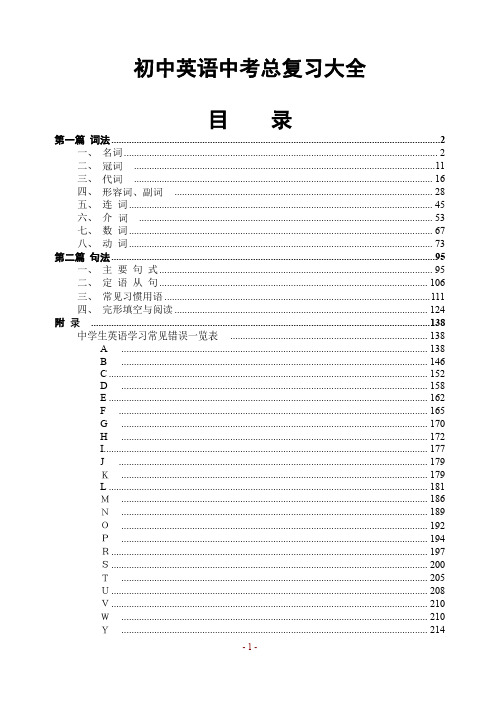
初中英语中考总复习大全目录第一篇词法 (2)一、名词 (2)二、 (11)三、 (16)四、 (28)五、连词 (45)六、介 (53)七、数词 (67)八、动词 (73)第二篇句法 (95)一、主要句式 (95)二、定语从句 (106)三、常见习惯用语 (111)四、完形填空与阅读 (124)附 (138) (138)A (138)B (146)C (152)D (158)E (162)F (165)G (170)H (172)I (177)J (179) (179)L (181) (186) (189) (192) (194)R (197)S (200) (205)U (208)V (210) (210) (214)第一篇词法一、名词(一) 知识概要名词的概念在不同的语法教课书中有不同的解释和分类方法,但就实际应用来讲还是不要过分地追求其理论概念,而更多的要把注意力放在其应用上来。
我们不妨把它分为两大类:专有名词与普通名词。
顾名思义,专有名词是指:个人、事物、机关等所专有的名称,如,the Great Wall,America…它们是不能随意变动的。
而普通名词中则包括个体名词,如pen, worker…它表示单一的个体人或事物;集体名词,如:family,class,team,它表示的是由若干个个体组成的集合体;物质名词,如:water,paper…它表示的是一种物质,原材料;而后一种是抽象名词,如:work, time…它表示着一种在实际生活中看不见、摸不到,但却与实际生活紧密相关的某些动作、状态、品质的抽象概念。
见下表。
名词一览表种类专有名词London, John, the Communist Party of China普通名词类名词nurse, boy, worker, pencil, dog, table集体名词class, family, army, police, team, people物质名词water, steel, glass, cotton, wood, sand抽象名词happiness, love, work, life, courage, honest功用主语My family is now in New York.表语His father is a scientist.宾语We love our great motherland.宾语补足语He made London the base for his work.定语The girls are making paper flowesrs.状语The car cost him 1000 dollars.同位语Mr Brown, a famous scientist, will come here.名词在使用中的难点在于名词的数,即可数名词与不可数名词的实际应用。
初中英语必背知识点(专题复习)
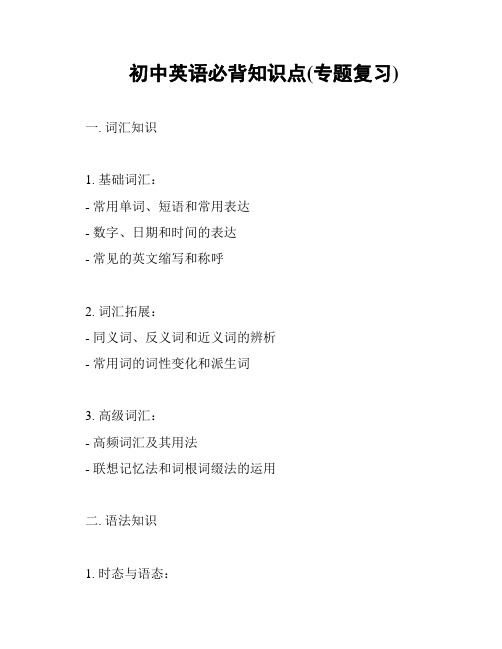
初中英语必背知识点(专题复习)
一. 词汇知识
1. 基础词汇:
- 常用单词、短语和常用表达
- 数字、日期和时间的表达
- 常见的英文缩写和称呼
2. 词汇拓展:
- 同义词、反义词和近义词的辨析
- 常用词的词性变化和派生词
3. 高级词汇:
- 高频词汇及其用法
- 联想记忆法和词根词缀法的运用
二. 语法知识
1. 时态与语态:
- 现在、过去和将来时的用法
- 被动语态的构成和应用
2. 句子结构:
- 主谓一致和主谓宾的搭配
- 并列句、复合句和简单句的转换
3. 修辞手法:
- 比喻、拟人和夸张的运用
- 省略、倒装和强调的使用
三. 阅读理解
1. 阅读技巧:
- 标题、目的和主题的推测
- 推理、推断和判断的训练
2. 阅读策略:
- 首句和细节的关键把握
- 上下文和语境的理解
四. 写作技巧
1. 作文要求:
- 书信、应用文和议论文的写作
- 开头、结尾和段落的构思
2. 写作方法:
- 归纳、列举和论证的技巧
- 表达清晰、连贯和正确的方法
以上是初中英语必背知识点的专题复,通过掌握这些知识,能够更好地应对英语考试,提高自己的语言水平。
(字数:xxx)。
初中英语知识点(复习资料完整版)

初一年级(上)【知识梳理】I. 重点短语1. Sit down 坐下2. on duty 值班3. in English 用英语4. have a seat 有座位5. at home 在家6. look like 看上去像7. look at 看8. have a look 与look at同义,看9. come on 加油;得了吧;快点10. at work 工作11. at school 上学12. put on 穿上13. look after 照顾14. get up 起床15. go shopping 购物II. 重要句型1. help sb. do sth. 帮助某人做某事2. What about…? 建议,做。
怎么样what about doing sth ?=how about doing sth ?=why not do sth ?3. Let‟s do sth. 让我们做某事4. It‟s time to do sth. 是做某事的时候了it is time for sb to do sth =it is time that sb did sth=it is time that sb should do sth5. It‟s time for 是做什么的时候了…6. What‟s…? It is…/ It‟s… 是什么?它是7. Where is…? It‟s….在哪儿?在。
8. How old are you? I‟m…你多大了?.9. What class are you in? I‟m in….你在哪个班10. Welcome to…. 欢迎来到(welcome to our school 欢迎来到我们的学校)11. What‟s …plus…? It‟s…. 几加几时多少?what is 5 plus 8?it is 13.12. I think… 我认为13. Who‟s this? This is…. 那是谁14. What can you see?I can see….你可以看到什么15. There is (are) …. 有。
初中英语总复习知识点归纳(基本全了)
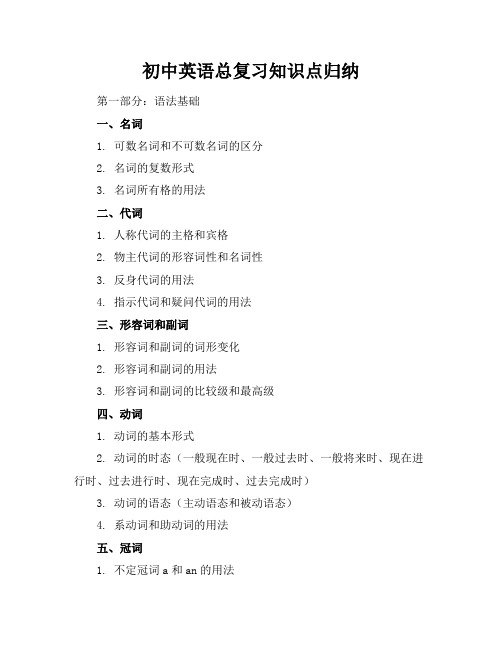
初中英语总复习知识点归纳第一部分:语法基础一、名词1. 可数名词和不可数名词的区分2. 名词的复数形式3. 名词所有格的用法二、代词1. 人称代词的主格和宾格2. 物主代词的形容词性和名词性3. 反身代词的用法4. 指示代词和疑问代词的用法三、形容词和副词1. 形容词和副词的词形变化2. 形容词和副词的用法3. 形容词和副词的比较级和最高级四、动词1. 动词的基本形式2. 动词的时态(一般现在时、一般过去时、一般将来时、现在进行时、过去进行时、现在完成时、过去完成时)3. 动词的语态(主动语态和被动语态)4. 系动词和助动词的用法五、冠词1. 不定冠词a和an的用法2. 定冠词the的用法3. 不使用冠词的情况六、连词1. 并列连词的用法2. 从属连词的用法七、介词1. 常用介词的用法2. 介词短语的结构和用法八、数词1. 基数词和序数词的用法2. 分数、小数和百分数的表达九、感叹词1. 感叹词的用法十、疑问词1. 疑问词的用法十一、句型结构1. 简单句的五种基本句型2. 并列句和复合句的结构和用法十二、主谓一致1. 主谓一致的原则2. 主谓一致的特殊情况十三、倒装句1. 完全倒装和部分倒装的区别2. 常见的倒装句型十四、省略句1. 省略句的结构和用法十五、强调句1. 强调句的结构和用法十六、虚拟语气1. 虚拟语气的用法十七、情态动词1. 情态动词的用法十八、非谓语动词1. 非谓语动词的分类和用法十九、固定搭配1. 常见的固定搭配二十、习惯用语和俚语1. 常见的习惯用语和俚语第二部分:词汇与短语一、词汇记忆方法1. 词根词缀记忆法2. 同义词和反义词记忆法3. 分类记忆法4. 联想记忆法二、常见词汇和短语1. 常用动词短语2. 常用形容词短语3. 常用介词短语4. 常用连词短语5. 常用固定搭配三、词汇辨析1. 形近词辨析2. 意思相近的词辨析3. 语境辨析四、词汇应用1. 词汇在句子中的应用2. 词汇在段落中的应用3. 词汇在文章中的应用五、词汇扩展1. 通过阅读扩展词汇2. 通过听力扩展词汇3. 通过口语和写作扩展词汇六、词汇复习策略1. 制定词汇复习计划2. 定期进行词汇测试3. 反复记忆和复习第三部分:阅读理解一、阅读技巧1. 快速阅读2. 精读3. 猜词技巧4. 理解文章主旨和大意5. 找出文章中的细节信息二、阅读题型1. 主旨大意题2. 细节理解题3. 推理判断题4. 词义猜测题5. 观点态度题三、阅读材料1. 故事类文章2. 议论文3. 说明文4. 应用文5. 新闻报道四、阅读理解策略1. 预览文章和首段2. 扫读文章找出关键词3. 仔细阅读理解文章内容4. 回答问题时注意关键词和语境5. 验证答案是否符合文章内容第四部分:写作技能一、写作技巧1. 确定写作目的和主题2. 拟定写作提纲3. 运用适当的句型和词汇4. 保持文章逻辑清晰5. 注意文章格式和标点符号二、写作题型1. 记叙文2. 议论文3. 说明文4. 应用文5. 日记和书信三、写作素材1. 人物描写2. 地点描写3. 事件描写4. 情感表达5. 观点陈述四、写作策略1. 多读优秀范文2. 多练习写作3. 请教老师和同学4. 反复修改和润色5. 保持写作兴趣和热情第五部分:听力理解一、听力技巧1. 预测听力内容2. 抓住关键词和关键信息4. 边听边记笔记5. 理解对话和独白的逻辑关系二、听力题型1. 简单听力理解题2. 听力细节理解题3. 听力推理判断题4. 听力主旨大意题5. 听力词义猜测题三、听力材料1. 对话2. 独白3. 新闻报道4. 广播节目5. 电影和电视剧片段四、听力理解策略1. 预览问题和选项2. 仔细听录音,注意关键词3. 根据听力内容进行推理和判断4. 选择最符合听力内容的答案5. 检查答案是否符合题意第六部分:口语表达一、口语技巧1. 准备话题和内容3. 保持语速适中4. 注意语法和词汇的准确性5. 保持自信和流畅二、口语题型1. 自我介绍2. 话题讨论3. 角色扮演4. 观点陈述5. 回答问题三、口语素材1. 日常生活话题2. 学校生活话题3. 社会热点话题4. 个人兴趣爱好话题5. 旅游和文化话题四、口语表达策略1. 多听多说,提高口语能力2. 模仿优秀的口语表达3. 与老师和同学进行口语练习4. 参加英语角和口语比赛5. 记录自己的口语表达,进行反思和改进第七部分:综合技能一、综合技巧1. 综合运用语法、词汇、阅读、写作、听力和口语等技能2. 注重语言的实际运用能力3. 提高语言的综合运用水平4. 培养跨文化交际能力5. 保持学习英语的兴趣和动力二、综合题型1. 完形填空2. 阅读理解3. 写作4. 听力理解5. 口语表达三、综合复习策略1. 制定综合复习计划2. 定期进行综合测试3. 反复练习和复习4. 请教老师和同学5. 保持学习英语的兴趣和热情。
初中英语总复习知识点1.英语句子结构和从句

英语句子成分:1)主语:动作或状态的发出者;She likes cats. I am a teacher.2)谓语:主语的动作或状态;3)宾语:谓语的对象,内容,承受者;4)定语:修饰名词和代词的成分;It’s a cute dog.5)状语:修饰其他;He runs fast.6)补语:补充说明主语或宾语;I asked her to study hard. She is asked to study hard.7)表语:连系动词后独立完整的意群;8)同位语:解释说明其他;Mrs. Liu, my English teacher, is very nice to us.9)独立成分:感叹语;称呼语;插入语。
How delicious it is! For example, you can read English every day.英语句子结构:由主谓+谓语+其他构成,意义完整。
1)简单句:1个(并列)主语+1个(并列)谓语;I like cats. She and I like cats. I dance and sing.2)并列句:由关联词连接的两个或以上简单句:but,so,or.I like cats but she likes dogs.She stayed up late yesterday, so she is tired now.Study hard, or you will fail the exam.3)主从复合句:名词性从句;定语从句;状语从句。
(一)名词性从句包括主语从句,宾语从句,表语从句,同位语从句。
常用关联词:that, if/whether, what/how/when等特殊疑问词。
宾语从句作为重点:宾语从句考察点:1.否定转移:I don’t think it’s good for you.2.If 引导宾从做“是否”,引导状从做“如果”.3.句中有or not且连用时,只可用whether, 不用if.4.从句用陈述语序:The teacher asked him why he was late.5.时态:主过从过.(二)定语从句:=先行词+定从(关系词+其他)(三)状语从句:考点:时间条件状从时态:主将从现。
初一英语语法知识点总结复习超详细
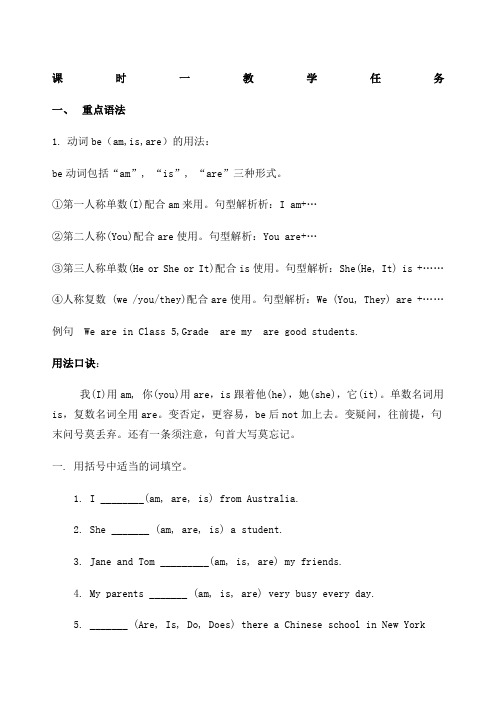
课时一教学任务一、重点语法1.动词be(am,is,are)的用法:be动词包括“am”, “is”, “are”三种形式。
①第一人称单数(I)配合am来用。
句型解析析:I am+…②第二人称(You)配合are使用。
句型解析:You are+…③第三人称单数(He or She or It)配合is使用。
句型解析:She(He, It) is +……④人称复数 (we /you/they)配合are使用。
句型解析:We (You, They) are +……例句 We are in Class 5,Grade are my are good students.用法口诀:我(I)用am, 你(you)用are,is跟着他(he),她(she),它(it)。
单数名词用is,复数名词全用are。
变否定,更容易,be后not加上去。
变疑问,往前提,句末问号莫丢弃。
还有一条须注意,句首大写莫忘记。
一. 用括号中适当的词填空。
1. I ________(am, are, is) from Australia.2. She _______ (am, are, is) a student.3. Jane and Tom _________(am, is, are) my friends.4. My parents _______ (am, is, are) very busy every day.5. _______ (Are, Is, Do, Does) there a Chinese school in New York6. _______ (Be, Are, Were, Was) they excited when he heard the news7. There _____ (be) some glasses on it.8. If he _____ (be) free tomorrow, he will go with us.一、用be 动词的适当形式填空1. I ______ a boy. ______ you a boy No, I _____ not.2. The girl______ Jack's sister.3. The dog _______ tall and fat.4. The man with big eyes _______ a teacher.5. ______ your brother in the classroom6. Where _____ your mother She ______ at home.7. How _______ your father8. Mike and Liu Tao ______ at school.9. Whose dress ______ this10. Whose socks ______ they11. That ______ my red skirt.12. Who ______ Ijeans ______ on the desk.______ a scarf for you.15. Here ______ some sweaters for you.16. The black gloves ______ for Su Yang.17. This pair of gloves ______ for Yang Ling.18. The two cups of milk _____ for me.19. Some tea ______ in the glass.20. Gao shan's shirt _______ over there.第二课时(1)英语人称代词和物主代词一、人称代词表示“我”、“你”、“他”、“她”、“它”、“我们”、“你们”、“他们”的词,叫做人称代词。
- 1、下载文档前请自行甄别文档内容的完整性,平台不提供额外的编辑、内容补充、找答案等附加服务。
- 2、"仅部分预览"的文档,不可在线预览部分如存在完整性等问题,可反馈申请退款(可完整预览的文档不适用该条件!)。
- 3、如文档侵犯您的权益,请联系客服反馈,我们会尽快为您处理(人工客服工作时间:9:00-18:30)。
初中英语总复习一、初中英语词组总结1. (see 、hear 、notice 、find 、feel 、listen to 、look at (感官动词)+ doeg :I like watching monkeys jump.2.(比较级and 比较级)表示越来越怎么样3. a piece of cake =easy 小菜一碟(容易)4. agree with sb. 赞成某人5. all kinds of 各种各样 a kind of 一样6. all over the world = the whole world 整个世界7. along with 同……一道,伴随……eg: I will go along with you. 我将和你一起去The students planted trees along with their teachers. 学生同老师们一起种树8. As soon as 一怎么样就怎么样9. as you can see 你是知道的10. ask for ……求助向…要…(直接接想要的东西)eg: ask you for my book.11. ask sb for sth 向某人什么12. ask sb to do sth 询问某人某事ask sb not to do 叫某人不要做某事13. at the age of 在……岁时eg:I am sixteen. I am at the age of sixteen.14. at the b eginning of …………的起初;……的开始15. at the end of +地点/+时间最后;尽头;末尾eg : At the end of the day.16. at this time of year 在每年的这个时候17. be /feel confident of sth /that clause +从句感觉/对什么有信心,自信eg : I am / feel confident of my spoken English.I feel that I can pass the test.18. be + doing 表:1 现在进行时2 将来时19. be able to (+ v 原) = can (+ v 原)能够……eg: She is able to sing;She can sing.20. be able to do sth 能够干什么eg :she is able to sing.21. be afraid to do (of sth 恐惧,害怕……eg: I'm afraed to go out at night.I'm afraid of dog.22. be allowed to do 被允许做什么eg: I'm allowed to watch TV. 我被允许看电视I should be allowed to watch TV. 我应该被允许看电视23. be angry with sb. 生某人的气eg : Don't be angry with me.24. be angry with(at) sb for doing sth 为什么而生某人的气25. be as…原级…as和什么一样eg : She is as tall as me. 她和我一样高26. be ashamed to27. be away from 远离28. be away from 从……离开29. be bad for 对什么有害eg: Reading books in the sun is bad for your eyes. 在太阳下看书对你的眼睛不好30. be born in 出生于31. be busy doing sth. 忙于做什么事be busy with sth. 忙于……32. be careful 当心;小心33. be different from……和什么不一样34. be famous for 以……著名35. be friendly to sb. 对某人友好36. be from = come from 来自eg:He is from Beijing.He comes from Beijing.Is he from Beijing?Does he come from Beijing?37. be full of 装满……的be filled with 充满eg: The glass is full of water ;The glass is filled with water.38. be glad+to+do/从句39. be going to + v(原)将来时40. be good at(+doing) = do well in 在某方面善长, 善于……41. be good for 对什么有好处eg : Reading aloud is good for your English.42. be happy to do 很高兴做某事43. be helpful to sb 对某人有好处eg : Reading aloud is helpful to you. 大声朗读对你有好处Exercising is helpful to your bady. 锻炼对你的身体有好处44. be in good health 身体健康45. be in trouble 处于困难中eg : She is in trouble They are in trouble.46. be interested in 对某方面感兴趣47. be late for = come late to 迟到eg: Be late for class 上课迟到48. be like 像……eg : I'm like my mother49. be mad at 生某人的气50. be made from 由……制成(制成以后看不见原材料)51. be made of 由……制成(制成以后还看得见原材料)52. be not sure 表不确定53. be on a visit to 参观54. be popular with sb 受某人欢迎55. be quiet 安静56. be short for 表**的缩写eg: 陶is short for 陶俊杰57. be sick in bed 生病在床58. be sorry to do sth be sorry for sb eg : I am sorry for you59. be sorry to hear that60. be sorry to trouble sb eg : I am sorry to trouble you61. be strict in doing sth 严于做某事eg : He's strict in obeying notes.62. be strict with sb 对某人要求严格eg: Some students are not strict with them selves 这些学生对自己不严格63. be strict with sb in sth 某方面对某人严格64. be supposed to do 被要求干什么65. be sure 表确定66. be sure of doing sth 对做某事有信心eg: He is sure of winning I am sure of learning English well67. be sure of sth 对做某事有信心eg: I'm sure of my head (my teacher 我相信我的大脑(老师)68. be sure that sth 对做某事有信心eg: I'm sure that he can pass the test 我相信他能通过考试69. be sure to do sth 一定会做某事eg: We are sure to pass the test 我们一定会通过这次考试We are sure to learn English well 我们一定能学好英语70. be terrified of + 名/动doing 害怕……71. be terrified to do sth 害怕做某事72. be the same as …和什么一样73. be used to doing sth 习惯做某事eg: My father is used to getting up early. 我爸爸习惯早起He is used to sleeping in class. 他习惯上课睡觉He is used to working hard.He is used to hard work. 他习惯努力工作74. be worth doing 值得做什么75. be(feel) afraid to do sth. 害怕做某事be afraid of sth. 害怕某物be afraid that 丛句76. because+句子because of +短语eg: He was late because he had a headache.He was late because of his headache.77. begin to do = start to do 开始做某事start…with…=begin…with… 以什么开始什么eg : Let's begin the game with the song. I begin to go home.78. between…and…两者之间79. borrow sth. from sb. 向……借……lend sth to sb. ( lend sb sth). 借给……什么东西eg : I borrowed a pen from him he lent a pen to me ( he lent me a pen).80. both = the same(as) = not different(from) 表相同81. bother 打扰bother sb to do stheg : I'm sorry to bother you ,but can you tell me the way to the station.我十分道歉打扰你,但是你能告诉我怎么去车站The problem has been bothering me for weeks. 这个问题困扰了我几个周了He's bothering me to lend him money.82. by the end of 到……为止83. call sb sth eg : We call him old wang.84. care 关心eg : Don't you care about this country's future? 你为什么不关心国家的未来85. catch up with sb. 赶上某人86. chat with sb. 和某人闲谈take sb to + 地点带某人去某地87. come in 进来88. come over to 过来89. come up with 提出eg: Can you come up with a good idea. 你能想出一个好办法吗?90. communicate with sb. 和某人交流91. consider + doing 考虑做什么eg : Why not consider going to Lu Zhou. 为什么不考虑去泸州?92. dance to 随着……跳舞eg : She likes dancing to the music. 她喜欢随着音乐跳舞93. decide to do sth. 决定做某事94. do a survey of 做某方面的调查95. do better in 在……方面做得更好96. do wrong 做错97. Don't forget to do sth. 不要忘了做某事98. Don't mind +doing /从句/名词不要介意……99. each +名(单)每一个……eg : Each student has many books. 每一个学生都有一些书100. end up +doing101. enjoy +doing 喜欢102. escape from 从……逃跑eg: The prisoners have escaped from the prison. 犯人从监狱里逃跑出来Some gas is escaping from the pipe. 有一些气体从管子里冒出103. expect to do sth 期待做某事104. fall down 摔下来fall off 从哪摔下来105. fall in love with sb /sth 爱上什么106. far from 离某地远eg : The school is far from my home.107. find +it +adj +to do 发现做某事怎么样108. find sb/sth +adj 发现什么怎么样?eg : I find the book interesting .109. finish 完成+doing(名词)110. fit to sb = be fit for sb 适合某人111. forget to do 没有做而忘了forget doing 做了而又忘了eg: Don't forget to go home. I forget closing door.112. from…to…从某某到某某eg: From me for her.113. get /have sth down 做完,被(别人)做……eg: I have my hair cut. 我理了发(头发被剪了)Tom got his bad tooth pulled out. 汤母把他的坏牙拔掉了(被牙医拔掉了)114. get a part-time job = find a part-time job115. get along well with sb. = get on well with sb. 与某人相处得好116. get along with sb. = get on with sb. 与某人相处117. get ready for = be ready for 为什么而准备eg : I get ready for math. I am ready for math.118. get sb in to trouble 给某人麻烦119. get sb to do sth120. get…from… 从某处得到某物121. give a talk 做报告eg: He is giving a talk.122. give sth to sb give sb sth 给某人某物123. go fish 钓鱼go swimming 游泳124. go on to do 去做下一件事go on doing 继续做这件事125. go out away from go out of126. go to school 上学(用于专业的)go to the school 去学校(不一定是上学)127. good way to 好方法128. hate to do 讨厌没做过的事hate doing 讨厌做过的事129. have a party for sb 举办谁的晚会130. have a talk 听报告谈一谈131. have been doing 现在完成进行时eg: You have been talking.You have been sleeping since.132. have been to …(地方)……去过某过地方have gone to …(地方)去了某地还没回来133. have fun +doing 玩得高兴134. have sth to do 有什么事要做eg: I have a lot of homework to do. 我有很多家庭作业要做I have nothing to do. 我没什么事情做135. have to do sth. 必须做某事136. have trouble (problem) (in) doing sth. 做什么事情有麻烦137. have…time +doing138. have…(时间)…o ff 放……假eg: I have a month off. 我请一个月得假139. hear sb +do/doing 听见某人做某事/正在做某事140. help a lot 很大用处141. help sb. with sth. \one's sth. 帮助某人某事(某方面)help sb. (to) do sth. 帮助某人做某事142. hope to do sth 希望做某事143. How about(+doing) = What about(+doing)144. how do you like = what do you think of 你对什么的看法145. if : 是否=wethereg: I don't know if (wether) I should go to the party. 我不知道我是否应该去参加晚会He don't know if (wether) we will arrive on time tomorrow morning. 他不知道我们明天早上是否能准时到达146. if : 如果,假如(全部接一般时态)+条件语态从句eg: I'll go to Lu Zhou if it doesn’t rain假如明天不下雨,我就去泸州If they change the plan they will let me know. 假如他们要改变计划,他们会让我知道的I'll go to England ,if I have enough money next year. 如果我明年由足够的钱,我就要去英国147. in one's opinion = sb think 某人认为148. in some ways 在某些方面149. in the end = finally(adv) 最后150. in the north of…什么在什么的北方(north 北south 南 west 西east 东)151. in the sun 在太阳下152. increase 增加eg: They've increased the prece of petrol by 3%. 他们把石油价增加了3% The population has increased from 12 million ten years ago to 18 million now.153. instead of +(名)代替eg: I'd like an apple instead of a pear. 我想要苹果,而不要梨子I like English instead of math. 我喜欢英语而不喜欢数学154. introduce sb to sb 介绍某人给某人introduce oneself 自我介绍155. invite sb to do sth 邀请某人做某事156. It takes sb sometime to do sth. 做某人花掉某人多少时间eg : It took me 5 minutes to do my homework. It takes me half an hour to cook.157. It's +adj +for sb to do sth. 对某人来说做某事怎么样158. It's +adj +to do 做某事怎么样159. It's +adj for sb. 对于某人来说怎么样It's +adj of sb. 对某人来说太怎么样160. It's +adj(for sb.) to do(对某人来说)做某事怎么样It's +adj of sb. to do sth. 对某人来说做某事太怎么样eg: It's nice of you to help me with my English.161. It's a good idea for sb to do sth 对……来说是个好主意162. It's important to sb 对某人来说很重要eg: It's important to me.163. It's time to do sth. It's time for sth. 到了该去做某事的时间eg : It's time to have class. It's time for class. 该去上课了164. join = take part in 参加165. just now 刚才166. keep +sb /sth +adj /介词短语让什么保持什么样?167. keep out 不让…… 进入168. keep sb adj 让……保持…… eg: I want to keep my mother happy.keep healthy 保持健康169. key to +名词表示:某物的钥匙或某题的答案170. key to…answer to …key 可以是答题或钥匙171. laugh at… 取笑…… eg : Don't laugh at others. We laughed at the joke.172. learn by oneself 自学173. learn from sb. 向某人学习eg: We should learn from Lei Feng.174. learn to do sth. 学做某事175. let sb. do sth. 让某人做某事176. Let sb. down 让某人失望eg :We shouldn't let our parents down 我们不应该让我们的父母失望177. live from :离某地远178. live in +大地方/at +小地方居住在某地eg: I live in Lu Zhou.She lives at Xian.179. look after = take care of 照顾照看180. lose one's way 谁迷路eg : Lose your way. 你迷路181. make a decision to do sth. 决定做某事182. make friends with sb. 和谁成为朋友eg : I want to make friends with you.183. make it early 把时间定的早一点184. make on exhibition of oneself 让某人出洋相185. make sb /n +n 使什么成为什么eg: I made her my step mother.I made you my wife.186. make sb. /sth. +adj 使某人(某物)怎么样eg: You must made your bed clean187. make sb. /sth. adj 使某人/某物怎么样188. make sb. do sth. 让某人做某事eg : I made him write. 我以前让他写189. make up be made up of (被动语态)由……组成190. make…difference to…191. mind sb to do mind one's doing 介意……做什么192. most +名most of +代193. much too +形容词194. must be 一定195. need +名词196. need sb. do sth. 需要某人做某事197. need to do (实义动词)need do (情态动词)198. no /neither of hate to do no /neither of hate doing199. no +名词200. not anymore = no more 再也不……eg: He didn't cry any moreHe cried no more 他再也不哭201. not… (形、副)at all eg: He's not tall at all she doesn't jump far at all. 202. not…at all 一点都不203. not…either表否定,也不eg: I don't speak Japanese either.I don't have sister, either. 我也没有姐姐204. not…until直到……才……eg: I didn't sleep until my mother came backThe child didn't stop crying until I give her sugar205. offer / provide sb. with sth. 给某人提供206. offer sb. sth. ( offer sth. to sb. 提供什么东西给某人eg: I offer you water (I offer water to you 我给你提供水207. on one's way to…在谁去那的路上208. on the one hand 一方面on the other hand 另一方面209. on the phone = over the phone 用电话交谈210. on time 准时in time 及时211. one day =some day =someday 一天,有一天212. one of +可数名词的复数形式213. one to another 一个到另一个214. over and over again 一遍又一遍的eg : He cleaned the floor over and over again.215. part-time job 兼职工作fall-time job 全职工作216. pay for…付……钱pay the bill 开钱,付钱217. please +do218. please help yourself219. pleased with sb220. pool into = pore into221. practice +doing 练习做某事222. prefer sth to sth 相对……更喜欢……eg : I prefer physics to chemistry. 在物理和化学中,我更喜欢物理prefer doing to sth 更喜欢去做…不愿意去做…eg: He prefers riding a bike to diving 他更喜欢骑自行车,不开小车prefer to do sth rather than do sth 宁愿做…也不愿eg: My unde prefers to buy a now car rather than repaiv the used one 我叔叔更喜欢买新的车,也不去修旧车prefer sb not to do sth 更愿意…eg: I prefer her not to come 我不喜欢她不来223. pretend to do sth 装着去做什么pretend that 从句eg: The two cheats pretended to be working very hard. 这两个骗子装着努力工作.He pretended that he did not know the answer. 他装着不知道答案224. rather…than宁可……也不……eg: I would rather be a doctor than a teacher. 我愿肯当医生,也不当老师He likes dogs rather than cats. 他喜欢狗,不喜欢猫225. regard…as把……当作……eg: Please give my best regards to your family. 请带我向你的家人我最好的问候I regard you as my friend. 我把你当作我的朋友He shows little regard for others. 他不爱关心别人226. remid sb about sth 提醒某人什么事remid sb to do sth 提醒某人做某事eg : He remids me about cooking. (he remids me to cook). 他提醒我做饭227. remid sb of sth 使某人想起什么eg : The pictures remind me of my school days. 这照片使我想起了我的学校The words that (which) the teacher talke to remind me of my mother.228. return sth to sb 还什么东西给某人229. say to oneself 对自己说230. say to sb 对某人说231. sb spend some money on sth 花了多少钱在某事上232. sb spend sometime with sb 花了多少时间陪谁233. sb spend sometime(in) doing sth 花了多少时间做某事234. sb with sb +is sb and sb +are235. see sb do 看见某人做过某事see sb doing 看见某人正在做某事236. seem to do/be +adj 显得怎么样eg : You seem to be tired You seem to be happy237.. send +sb sth 送给某人某物238. send…to…把什么寄到哪里去?239. shock 使……震惊eg : Oh , It's only you ! You give me a shock 啊,是你呀!吓我一跳240. show sb sth 向某人展示某物eg : I show her the book.241. show sb sth = show sth to sb 拿什么东西给某人看eg: Show me your pen. Show your pen to me.242. show sth to sb 向某人展示某物eg : I show the book to her.243. some…others…一些……另一些……244. start…with…从……开始begin…with…从……开始245. stay away from 远离……eg : We're told to stay away from the animals whe visiting the zoo. 当我们参观zoo 时,我们要远离动物If you want to lose weight you'd better stay away from the sweet food. 徒工你想减肥,你最好远离甜食246. stop doing 停下正在做的事247. stop sb from doing sth 阻止某人做某事248. stop sb(from) doing 阻止某人做某事249. stop to do 停下正在做的事去做下一件事250. such +名这样,这种251. suit sb 适合某人252. surprise sb 使某人惊奇to one's surprise 令某人惊奇253. take classes 上课254. take sb to 把某人带去eg : I take you to the hospital.255. take walks = take a walk =go for a walk 散步256. ①talk to 对谁说eg : I talk to you.②talk with 和谁说eg : I talk with him.③talk of 谈到eg : we talked of you.④talk about 谈论关于……257. talk with sb 和某人说话258. teach sb sth 教某人做某事259. tell sb do sth 告诉某人做某事260. tell sb sth tell sb that 丛句tell sb not to do sth tell a story 261. tell sb sth 告诉某人某事262. tell sb to do sth 告诉某人做什么 tell sb not to do sth 告诉某人不要做什么263. tell…from…264. thank you for +doing265. the same +名词(doing)+as……266. the same…(名)…as as…(adj adv)…as相同267. the way to do sth =the way of doing sth 做某方面的方法the way to +地方去哪的路eg: Do you know the way to learn English?Do you know the way of learning English?268. the way to…(地点)到哪的路269. too…to…太怎样而不能……adj +enough to 足够…能…so…that +丛句太…所以…eg: He is too young to go to school = He is so young that he can't go to schoolHe is old enough to go to school =He is so old that he can go to school 270. translate ……into……把什么翻译成什么eg : Translate English into Chinese 271. travel with sb 和某人去旅游272. try one's best to do sth 尽某人最大的努力去做某事eg: I will try my best to learn English well273. try to do sth 想干什么,但没成功try doing sth 想干什么,已经做过了eg :He tried to climb 他想爬上去,但没成功He tried climbing 他想爬上去,已经做过了274. try…试衣服have a try 试一下275. turn down 开小←→turn up 开大276. turn off 关上←→turn on 打开open 拆开277. upside down 倒着278. visit to…参观某个地方279. wait for sb 等某人280. wait for sb to do sth 等某人做什么wait for sb 等某人wait for sometime 等多少时间eg : Would you please wait for me to get ready 等我准备好,好吗?Let's wait for the rain to stop 让我们等雨停吧281. wake sb up 把某人叫醒282. want to do sth 想做某事283. watch sb do sth 观看某人做某事284. welcome to +…(地方)欢迎到……285. what about +n /doing eg : what about an apple286. what if 如果……怎么办What if +句子eg : What if it is true ? 如果是真的怎么办?What if aliens should come to the earth 假如外星人来到地球怎么办?287. what they will do? = what to do288. What's the matter ? = What's the trouble ? = What's wrong ? 有什么困难?289. while +延续性动词290. why don't you do = why not do291. will you please do will you please not do292. with one's best = with the help of sb 在某人的帮助下293. with the help of sb 在某人的帮助下with one's help 294. work at…在某处工作295. work with sb 和某人一起工作296. would like sth /to do sth eg : I would like to go to Lu Zhou.297. would you please +do298. yet :至今,用在否定句中299. you'd better do. 最好做某事= you'd better not do. 最好不要做某事300. 不定式+v(原)301. 联系动词(taste吃起来/sound听起来/look看起来/smell闻起来)+adj 302. 名词、副词、形容词修饰enough 时, 形容词放在之前,名词副词放在之后303. 太多too much +不可数too many +可数much too 相当于very ,修饰形容词304. 向宾语提问:Whom305. 向地点提问:Where306. 向方式提问:How307. 向价格和不可数名词提问:How much308. 向可数名词提问:How many309. 向频率提问:How often310. 向时间段提问:How long311. 向时间提问:what time/when312. 向物主代词提问:Whose313. 向职业提问:what do/does……do314. 向主语提问:Who315. 在将来时中,……以后(用in,一般时态中,……以后(用after。
